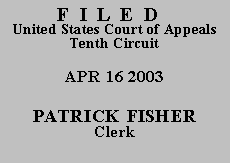

| STEVEN R. WOOD,
v.
H. N. SCOTT, Warden; ATTORNEY
GENERAL FOR THE STATE OF
OKLAHOMA, |
(D.C. No. CIV-01-1933-C) (W.D. Oklahoma) |
Before EBEL, HENRY, and HARTZ, Circuit Judges.
Mr. Wood filed a 28 U.S.C. § 2254 habeas corpus petition in federal district court asserting that: (1) the evidence is insufficient to support his conviction; (2) the trial court violated state law by allowing the jury to recess for the evening and continue deliberations the next morning, and his trial counsel's failure to object to the recess violated Mr. Wood's Sixth Amendment right to effective assistance of counsel; (3) the trial court deprived him of a fundamentally fair trial by improperly admitting the victim's testimony regarding a sexually explicit statement he made to her several weeks before the alleged rape; (4) the trial court deprived him of a fundamentally fair trial by failing to instruct the jury that the victim's testimony required corroboration and in failing to give a limiting instruction regarding the victim's testimony about Mr. Wood's prior statement; (alternatively, Mr. Wood argued that his counsel was constitutionally deficient in failing to object to these instructional errors); (5) the trial court erred in admitting, at Mr. Wood's sentencing proceeding, two judgments and sentences from prior felony convictions without redacting the references to the sentences imposed in the prior cases; and (6) cumulative errors entitle him to habeas corpus relief. Mr. Wood had unsuccessfully raised each of these claims before the Oklahoma Court of Criminal Appeals.
The federal district court referred the case to a magistrate judge, who concluded that Mr. Wood was not entitled to habeas relief. The district court adopted the magistrate judge's report and recommendation and denied Mr. Wood's petition.
Mr. Wood now seeks a certificate of appealability (COA) to appeal the district court's denial of his habeas petition. He also seeks to proceed in forma pauperis (IFP). In order to obtain a COA, Mr. Wood must make "a substantial showing of the denial of a constitutional right." 28 U.S.C. § 2253(c)(2). Mr. Wood may make this showing by demonstrating that "'reasonable jurists would find the district court's assessment of the constitutional claims debatable or wrong.'" Miller-El v. Cockrell, 123 S. Ct. 1029, 1040 (2003) (quoting Slack v. McDaniel, 529 U.S. 473, 484 (2000)). "[A] claim can be debatable even though every jurist of reason might agree, after the COA has been granted and the case has received full consideration, that [the] petitioner will not prevail." Miller-El, 123 S. Ct. at 1040. To proceed IFP, Mr. Wood must show "a financial inability to pay the required fees and the existence of a reasoned, nonfrivolous argument on the law and facts in support of the issues raised on appeal." McIntosh v. United States Parole Comm'n, 115 F.3d 809, 812 (10th Cir. 1997) (internal quotation marks omitted).
Because Mr. Wood filed his habeas petition after April 24, 1996, the effective date of the Antiterrorism and Effective Death Penalty Act (AEDPA), the AEDPA's provisions apply. Brown v. Warden, Springfield Medical Center for Federal Prisoners, 315 F.3d 1268, 1269 (10th Cir. 2003). Under AEDPA, "a federal habeas court may not grant relief "simply because that court concludes in its independent judgment that the relevant state-court decision applied clearly established federal law erroneously or incorrectly." Williams v. Taylor, 529 U.S. 362, 411 (2000) (discussing 28 U.S.C. § 2254(d)). Rather, that application must be objectively unreasonable. See id. at 409.
For substantially the same reasons set forth in the magistrate judge's report and recommendation, we conclude that Mr. Wood has failed to present a colorable argument that the OCCA unreasonably applied federal law. Thus, "reasonable jurists would [not] find the district court's assessment of the constitutional claims debatable or wrong." Miller-El, 123 S. Ct. at 1040. Accordingly, we DENY Mr. Wood's application for a COA and his motion to proceed IFP and DISMISS this appeal
Entered for the Court,
Robert H. Henry
Circuit Judge
*. This order is not binding precedent, except under the doctrines of law of the case, res judicata, and collateral estoppel. The court generally disfavors the citation of orders; nevertheless, an order may be cited under the terms and conditions of 10th Cir. R. 36.3.